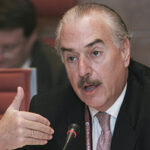Given the turbulent economic and political situation currently facing the world, the upcoming G20 summit in Los Cabos will have special relevance in its search for solutions and their application. The summit will bring together 19 countries, plus the European Union as an economic bloc, which jointly represent 90% of global GDP, 80% of world trade and two thirds of the world´s population. One of the themes at the center of international debate, and a topic for the summit, is the goal of green growth.
Why ¨green growth¨? Because only with growth is it possible to create jobs and prosperity, and only with green growth can we reduce current vulnerabilities and plan for the future. In this regard, it is fundamental that the G20 lead and direct sustainable, balanced, and equitable growth. The principle basis for making decisions should be that they are ¨environmentally sustainable, economically viable and socially just.¨
With this in mind, participants at the roundtable today analyzed three fundamental aspects of green growth:
- Management of limited resources to feed a growing population: in a world that is constantly growing, the world´s population faces major challenges that are only increasing due to the consequences of climate change. The global population will swell to almost 9.000 million people by 2040, and the number of middle class consumers will increase by 3.000 million people over the next 20 years; undoubtedly, the demand for resources will rise exponentially as well. By 2030, the world will need at least 50% more food, 45% more energy and 30% more water. To improve food security, we will have to take into account the management of water and energy resources that are needed for agricultural production.
- Green cities – energy efficiency, infrastructure and transportation networks: it is estimated that cities consume between 60-80% of energy traded, and are responsible for roughly the same proportion of emissions of greenhouse gasses. The urban population will represent 2/3 of the total population by 2030, and in less developed countries the urban population growth is increasing at a rate seven times higher than in developed nations. This can be seen as an opportunity to promote low carbon economic growth. Renewable energy, green buildings, technologies, construction, infrastructure, and transport are all sectors with considerable potential to link the fight against climate change with economic growth objectives, and are areas where the potential for creating jobs on a global scale is very important.
- Taxation and Fossil Subsidies – Financing change: the three most subsidized sectors in the world are agriculture, energy, and fishing. In 2009, governments around the world spent an estimated 312.000 million US dollars to subsidize the consumption of fossil fuels and another $100.000 million to subsidize the production of fossil fuel production. Also, according to the International Energy Agency, in 2010 only 8% of subsidies to fossil fuel consumption reached the poorest 20% of the population. The effects of gradually reducing subsidies for fossil fuels by 2020 would include a reduction in carbon dioxide emissions of 6.9% (2.4 gigatons) by 2020. If the amount spent on subsidizing fossil fuels was combined with tax measures on these resources, it would lead to an availability of financial resources that would permit an increase in the Green Fund and exponential increases in the financing of development programs.
Green growth requires the involvement of all sectors of society; major public-private alliances for the development of technology and infrastructure; academic research and citizen participation. All of this should take place under strong political leadership, supported by a legal framework that provides, both nationally and internationally, for green development. In this regard the involvement of all countries, especially of the G20 member countries who bring their high level of industrialization and internationally recognized leadership in economic cooperation, is necessary. The Club de Madrid hopes that the objective of green growth put in place by the Mexican Presidency can be strengthened and expanded by future presidencies of the G20.
The positive impact of green growth on a citizens´quality of life makes it a fundamental component of 21st century democracy. Green growth´s capacity to strengthen and enhance the quality of goods and services, and human development, contributes to the principle mission of the Club de Madrid: creating more effective democracies.
The roundtable was attended by various Members of the Club de Madrid, including: Joaquim Chissano (former President of Mozambique), Ruud Lubbers (former Prime Minister of the Netherlands), Jorge Quiroga (former President of Bolivia and Vice President of the Club de Madrid), and Andrés Pastrana (former President of Colombia). It also included representatives from the Mexican Presidency of the G20, including Dra. Lourdes Aranda (Undersecretary of Foreign Affairs and Sherpa to the G20), Gerardo Rodríguez Regordosa (Undersecretary of Foreign Affairs and Sherpa to the G20), Roberto Marino (Special Representative for the Mexican Presidency of the G20), and other politicians, academics, recognized world experts in green growth, and Mario Molina (President of the Mario Molina Center.)
Further information of the Club de Madrid G20 initiative




